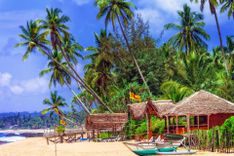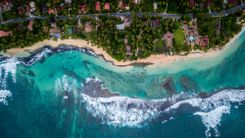Staying healthy in Sri Lanka
Sri Lanka’s heat, street food, and wild nature are half the fun – but they can also catch you off guard. A bit of planning and some smart packing go a long way toward avoiding health hiccups while you're island-hopping, train-tripping, or temple-hopping.
Food and water safety
Tap water’s a no in most places. Even in Colombo, it’s technically treated – but still not worth the gamble. Your stomach isn’t used to the local bacteria, so stick with bottled water – and always check that the cap’s sealed. Boiled water’s fine too – many guesthouses offer it for free.
Brush your teeth with bottled water outside the big hotels – it’s a small habit that’ll save you a rough day. In beach towns and hill stations, even the fancy eco-lodges sometimes use rainwater tanks – so ask before you sip.
Street food in Sri Lanka is chaotic and glorious – crispy egg hoppers, spicy kottu, fried isso vadai on the beach. Go for stalls with a queue – especially ones packed with tuk-tuk drivers or schoolkids. Locals know who makes it clean and hot. Skip anything that’s been sitting in the sun or under plastic wrap too long.
With fruit, buy it whole and peel it yourself. Bananas, papaya, rambutan, and wood apple are your friends. Pre-cut pineapple on Galle Face Green might look tempting – but unless you saw it sliced with clean hands, maybe pass.
Dealing with heat and humidity
Sri Lanka’s hot, in-your-face hot – and humid, especially along the coast and in the north. Expect highs around 88°F to 95°F (31°C to 35°C) and humidity above 80%. You’ll start sweating five minutes after breakfast. Plan on it.
If you’re heading into the Cultural Triangle, or doing long walks around ruins like Anuradhapura or Polonnaruwa – go early in the morning or late in the day. The midday sun will flatten you. SPF 50, sunglasses, and a hat aren’t optional.
In the hill country – Ella, Nuwara Eliya, Haputale – it cools down, especially at night. You won’t need sunscreen at 6 am on a tea estate hike, but dehydration still creeps up. Drink 3-4 liters a day. Electrolyte powders like Jeevani or Oralyte are easy to find in local pharmacies, or just bring a few sachets from home.
Jellyfish awareness
Jellyfish don’t make the headlines in Sri Lanka, but they’re around. East coast beaches like Nilaveli, Passikudah, and Arugam Bay sometimes report stings, especially from May to September. You probably won’t see any warning signs, so ask your guesthouse or dive shop if there’s been a spike.
The ones in Sri Lanka aren’t deadly – but they’ll ruin your swim if you get stung. A rash, swelling, or painful welts are common. If that happens, rinse with vinegar, not fresh water. And get to a clinic if it doesn’t calm down. Some beach cafes keep vinegar bottles on standby, if not, just ask.
Monkey interaction guidelines
You will meet monkeys. Around temples, on hiking trails, or casually walking across the road in Mirissa. Toque macaques – known locally as rilawa – are cheeky and smart. They hang around places like Dambulla Cave Temple, Sigiriya, and even the rail stations in Ella and Kandy. If your bag’s unzipped, they’ll check it for biscuits.
Don’t feed them, even if they look cute, and don’t stare or smile. That’s macaque language for “you want to fight?” Keep food in your bag and hang onto your water bottle, they’ve been known to snatch those too.
In places like Sinharaja Forest Reserve or Horton Plains, you might see purple-faced langurs – rarer, quieter, and not interested in your snacks. Still, give them space.
If a monkey scratches or bites you, clean the wound with soap and water, then go straight to a doctor. Rabies exists in Sri Lanka, and you’ll need post-exposure treatment, even if you’ve had the vaccine.











